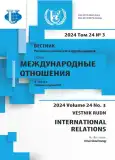The Interference Narrative in Australia - China Relations: Towards Confrontational Securitization
- Authors: Kireeva A.A.1
-
Affiliations:
- MGIMO University
- Issue: Vol 24, No 3 (2024): China’s Global Strategy
- Pages: 450-466
- Section: BILATERIAL RELATIONS
- URL: https://journal-vniispk.ru/2313-0660/article/view/320697
- DOI: https://doi.org/10.22363/2313-0660-2024-24-3-450-466
- EDN: https://elibrary.ru/YTXPEV
- ID: 320697
Cite item
Abstract
Theoretical research indicates that foreign interference, and even allegations thereof, cause long-term negative effects: they erode trust, damaging the bilateral relationship, and lead to a greater polarization of the political system and society due to the securitization of the relationship with the presumed interferer. The article examines the case of how the Australian government and society have reacted to the perceived attempts of interference by the People’s Republic of China (PRC). It tests theoretical hypotheses by answering the question of what are the implications of the above-mentioned issue for Australia - China relations and Australia’s politics. The study has identified that the rhetoric about foreign interference by the PRC into Australia’s internal affairs has been publicly attributed to a complex of attempts at unwanted influence not only in politics but also in other domains such as society, economics, education and mass media. This issue served as a critical juncture in initiating a downward trend in bilateral relations by significantly eroding Australia’s trust in China and public opinion about it as well as by prompting the Australian government to reassess its policy vis-à-vis the PRC against the background of challenging geopolitical landscape of the Asia-Pacific. The securitization of cross-border links with China has become a notable phenomenon. As a result of these events as well as other foreign policy factors, Australia - China relations deteriorated significantly. The Australian government promptly took a hard stance against the perceived foreign interference, becoming the first to adopt a special legislation to combat it. This issue was instrumentalized in political competition, especially by the Liberal Party of Australia. However, there has been no polarization of the Australian political system and society. The result has been a broad public and bipartisan consensus on the need for a greater transparency and public scrutiny over the links with China, as well as the establishment of an effective system to counter foreign interference. The Australian case demonstrates that the instrumentalization of the interference issue may lead not to a polarization but, on the contrary, to a domestic consensus over standing up to a perceived threat.
About the authors
Anna A. Kireeva
MGIMO University
Author for correspondence.
Email: a.kireeva@my.mgimo.ru
ORCID iD: 0000-0002-0376-9734
SPIN-code: 3248-3223
PhD (Political Science), Associate Professor, Department of Asian and African Studies; Senior Research Fellow, Institute of International Studies
Moscow, Russian FederationReferences
- Aleshin, A. A. (2020). Australian foreign policy strategy: Middle power in a highly competitive environment. Analysis and Forecasting. IMEMO Journal, (2), 63-75. (In Russian). https://doi.org/10.20542/afij-2020-2-63-75; EDN: BFFAXV
- Buzan, B., Wæver, O., & de Wilde, J. (1998). Security: A new framework for analysis. Boulder, CO: Lynne Rienner Publishers Inc.
- Dowling, M. E. (2021). Democracy under siege: Foreign interference in a digital era. Australian Journal of International Affairs, 75(4), 383-387. https://doi.org/10.1080/10357718.2021.1909534
- Fitzgerald, J. (Ed.). (2022). Taking the low road: China’s influence in Australian states and territories. Barton, ACT: Australian Strategic Policy Institute.
- Garin, A. A. (2021). Topical issues of Sino-Australia’s relations: Supply chains resilience and Australia’s critical infrastructure under China’s rule. South East Asia: Actual Problems of Development, 1(1), 207-219. (In Russian). https://doi.org/10.31696/2072-8271-2021-1-1-50-207-219; EDN: RJXVLL
- Graham, E. (2023). Australia’s security in China’s shadow. Abingdon and New York: Routledge. https://doi.org/10.4324/9781003426028
- Hamilton, C. (2018). Silent invasion: China’s influence in Australia. Richmond, Australia: Hardie Grant Books.
- Istomin, I. A. (2022). How not to interfere in another country’s domestic politics. International Affairs, 98(5), 1677-1694. https://doi.org/10.1093/ia/iiac191
- Istomin, I. A. (2023a). Foreign interference in internal affairs: Deconstruction of an essentially indeterminate concept. Polis. Political Studies, (2), 120-137. (In Russian). https://doi.org/10.17976/jpps/2023.02.09; EDN: CRNPDK
- Istomin, I. A. (2023b). Military deterrence vs foreign interference: Record of the Cold War. MGIMO Review of International Relations, 16(1), 106-129. DOI: https://doi.org/10.24833/2071-8160-2022-olf4; EDN: YRAXWG
- Kashin, V. B., Piatachkova, A. S., & Krasheninnikova, L. S. (2020). Chinese economic sanctions policy: Theory and practice. Comparative Politics Russia, 11(2), 123-138. (In Russian). EDN: DXBKYE
- Köllner, P. (2021). Australia and New Zealand recalibrate their China policies: Convergence and divergence. The Pacific Review, 34(3), 405-436. https://doi.org/10.1080/09512748.2019.1683598
- Levin, D. H. (2020). Meddling in the ballot box: The causes and effects of partisan electoral interventions. Oxford: Oxford University Press. https://doi.org/10.1093/oso/9780197519882.001.0001
- Medcalf, R. (2019). Australia and China: Understanding the reality check. Australian Journal of International Affairs, 73(2), 109-118. https://doi.org/10.1080/10357718.2018.1538315
- Suchkov, M. A. (2024). Foreign interference as a form of interstate competition: Types and motives. Polis. Political Studies, (3), 8-23. (In Russian). https://doi.org/10.17976/jpps/2024.03.02; EDN: ZLHUCK
- Tomz, M., & Weeks, J. L. P. (2020). Public opinion and foreign electoral intervention. American Political Science Review, 114(3), 856-873. https://doi.org/10.1017/S0003055420000064
- Wohlforth, W. C. (2020). Realism and great power subversion. International Relations, 34(4), 459-481. https://doi.org/10.1177/0047117820968858
Supplementary files









